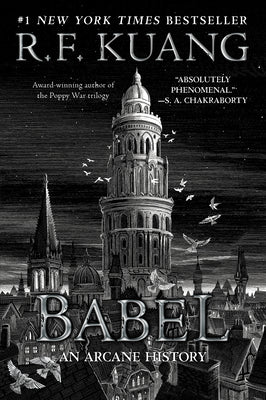Open Cover Books
Babel: Or the Necessity of Violence: An Arcane History of the Oxford Translators' Revolution
Babel: Or the Necessity of Violence: An Arcane History of the Oxford Translators' Revolution
Couldn't load pickup availability
REPRESENTATION:
AAPI, AAPI Author, AAPI Characters, Adopted, Black, Black Characters, Indian, Queer, Queer Characters
CONTENT WARNINGS:
Death of a parent, Alcohol, Assault, Child abuse, blood, Drugs, Emesis, Fire, Gun violence, Classism, Misogyny, Murder, Needles, Racism, Sexual harassment, Slavery, Torture, Violence
From award-winning author R. F. Kuang comes Babel, a thematic response to The Secret History and a tonal retort to Jonathan Strange & Mr. Norrell that grapples with student revolutions, colonial resistance, and the use of language and translation as the dominating tool of the British empire.
Traduttore, traditore: "An act of translation is always an act of betrayal."
1828. Robin Swift, orphaned by cholera in Canton, is brought to London by the mysterious Professor Lovell. There, he trains for years in Latin, Ancient Greek, and Chinese, all in preparation for the day he'll enroll in Oxford University's prestigious Royal Institute of Translation--also known as Babel.
Babel is the world's center for translation and, more importantly, magic. Silver working--the art of manifesting the meaning lost in translation using enchanted silver bars--has made the British unparalleled in power, as its knowledge serves the Empire's quest for colonization.
For Robin, Oxford is a utopia dedicated to the pursuit of knowledge. But knowledge obeys power, and as a Chinese boy raised in Britain, Robin realizes serving Babel means betraying his motherland. As his studies progress, Robin finds himself caught between Babel and the shadowy Hermes Society, an organization dedicated to stopping imperial expansion. When Britain pursues an unjust war with China over silver and opium, Robin must decide...
Can powerful institutions be changed from within, or does revolution always require violence?

Add on a surprise pick
-
Example product title
Price: Regular price From $20.00Regular priceUnit price per -
Example product title
Price: Regular price From $20.00Regular priceUnit price per -
Example product title
Price: Regular price From $20.00Regular priceUnit price per -
Example product title
Price: Regular price From $20.00Regular priceUnit price per

